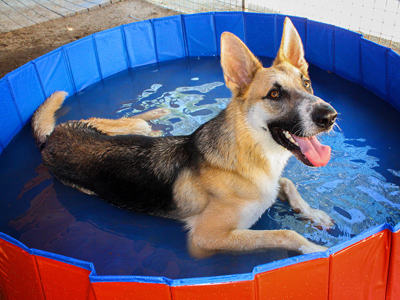Photo courtesy of HSVC – Niko enjoys some pool time while staying cool at the Humane Society of Ventura County shelter in Ojai, California. With hot weather upon us, it’s important for all pets to have ready access to fresh cool water and, if possible, a small pool to lounge in. (June 11, 2020)
As the summer heats up, the National Weather Service has issued a heat advisory in Ventura County and surrounding areas, with triple digit temps predicted in the coming days. As you heed the advisory, the Humane Society of Ventura County reminds you: Please don’t forget your pets.
The temperatures inside a parked car, in the bed of a pickup truck and on the sidewalk can be significantly higher than the ambient temperature and can seriously injure or even be fatal to pets.
Here are some things to remember, from the Humane Society:
- Walk your dogs in the early morning and evening hours and, before taking them out, check the temperature of asphalt or sidewalks. “Place your hand on the surface for seven seconds,” said Senior Humane Officer T. Vail of the HSVC. “If you can bear it, then it’s safe.”
- Avoid traveling with your dogs in the exposed backs of pickup trucks, which can be 20 to 40 degrees hotter than ambient temperature and unsafe for transport during the heat.
- Never leave a dog in a parked car in the heat; even with the windows ajar, the temps inside the car can quickly soar to dangerous levels.
- At home, if your pets are outdoors or contained in a hot space, it is crucial to have a proper setup for them. Be sure to provide plenty of fresh water (in the shade) in a nontip, light-colored plastic container and ensure they have access to proper shelter. In addition, HSVC Humane Officer K. King said, “If you live in a particularly hot area, it’s important to have proper ventilation at all times.”
If your pets show any sign of heat distress, remove them from the situation immediately, give them a limited amount of water, douse them in cool (not cold) water, and seek medical attention as quickly as possible. Signs of heatstroke (hyperthermia) and other heat distress in dogs can include panting, drooling, salivating, agitation, a bright red tongue, very red or pale gums, an increased heartrate, breathing distress, vomiting and diarrhea.
To avoid the danger in the first place, keep your pets indoors during the hottest part of the day. If it’s too hot for you, it’s too hot for them. Take them outside only when the ambient temperatures are mild.
“If you are uncomfortable outside during the heat, your pets are too,” said Greg Cooper, Director of Community Outreach for the HSVC. “The best thing is to keep them safely home during the hours of 10 a.m. to 7 p.m.,” Cooper added.
If you’re in public and see an animal in distress, call local law enforcement. The Humane Society has taken many calls but is not able to help in distress situations.
During the summer at the HSVC’s Ojai shelter, “we take every precaution to protect the animals under our care,” said Angela Hanline, Kennel Manager. The animals are kept in the facility’s cooler spaces for the heat of the day and the kennel floors are hosed down for additional relief, Hanline said, adding, “We also like to give the dogs access to water troughs where they can play and cool off, and we give them ‘pup-sicles,’” a custom dog treat made from ice.


Comments are closed